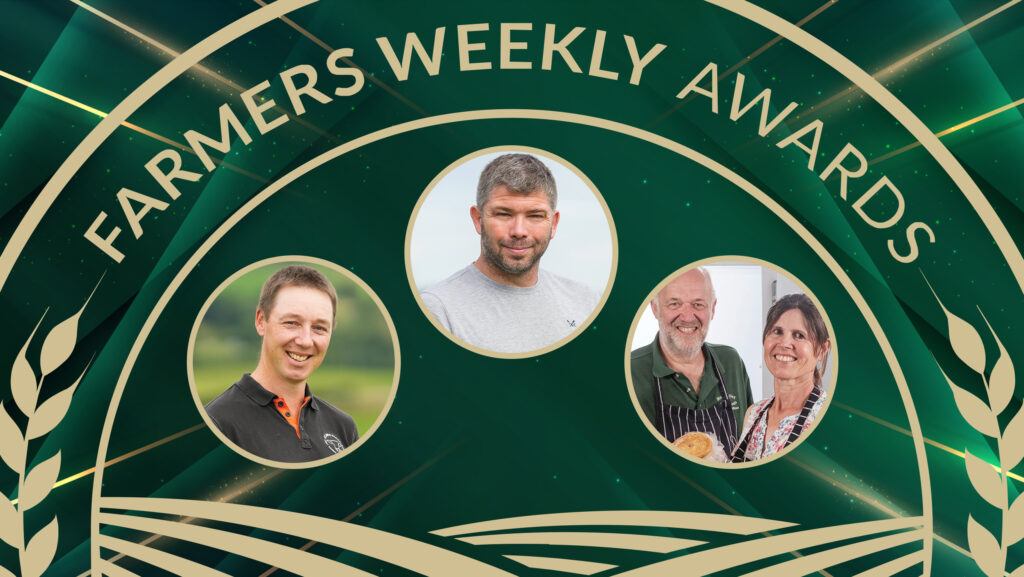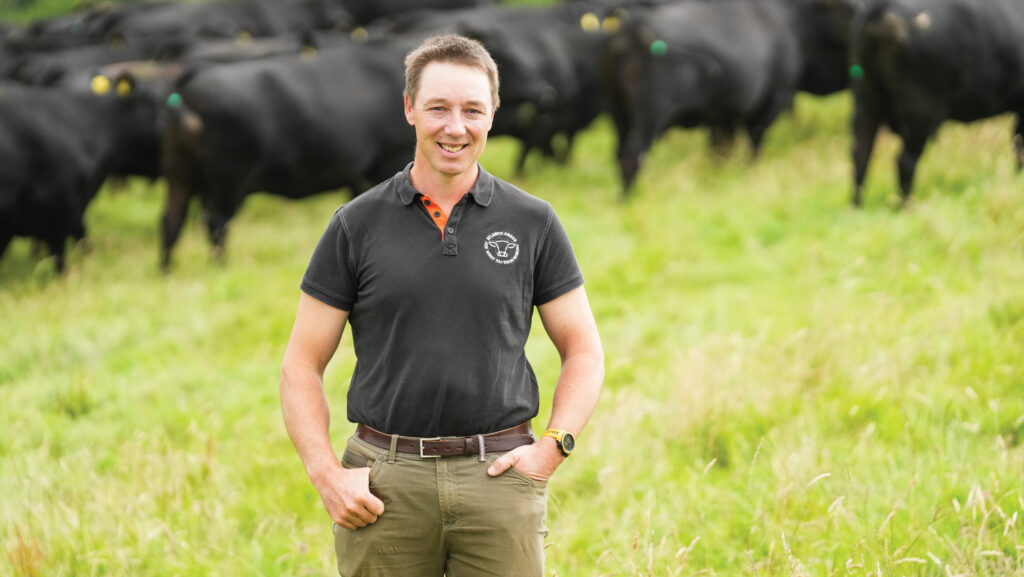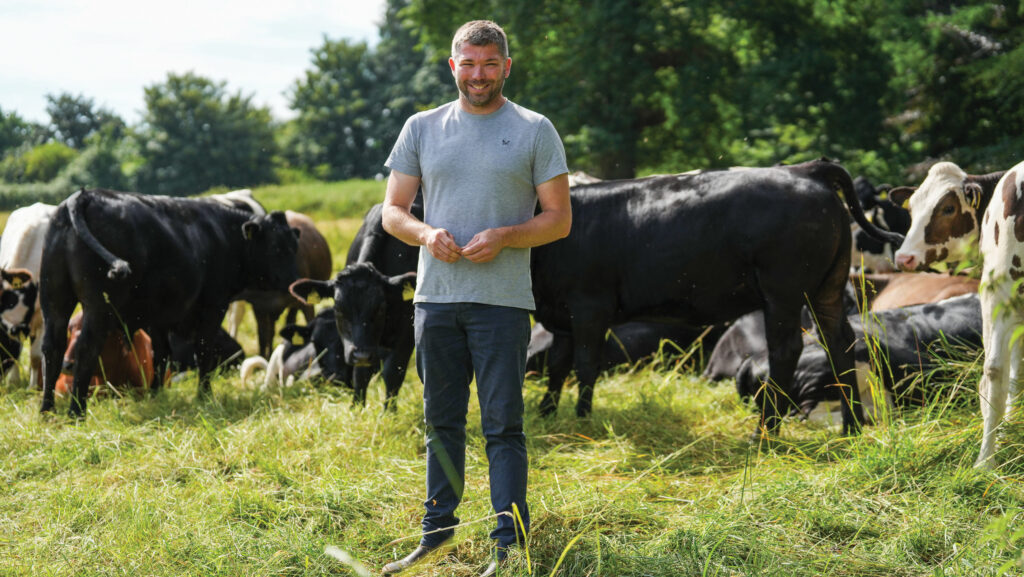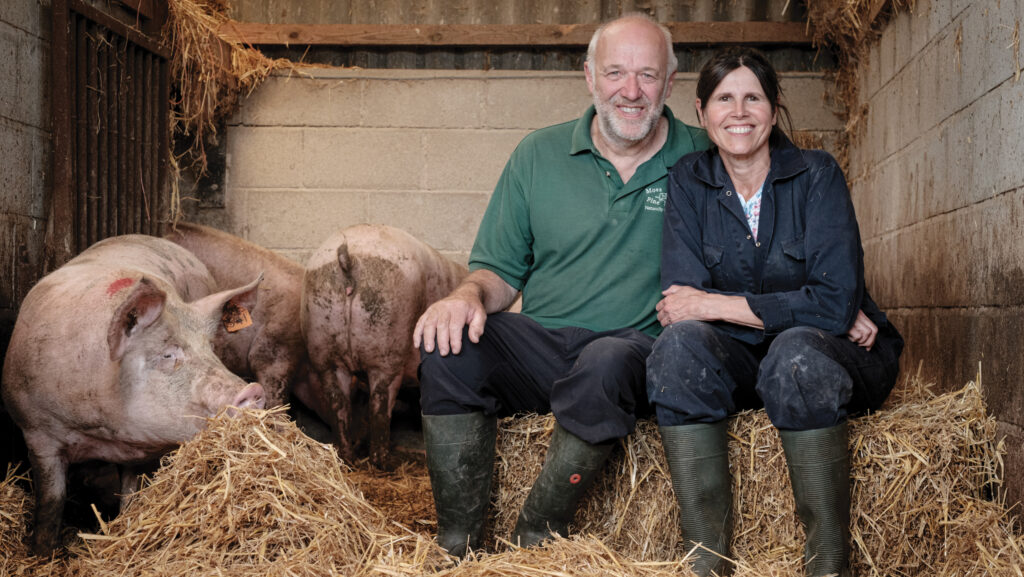FW Awards: Meet the 2025 Environmental Champion finalists
 Left to right: Jonathan Chapman, Ollie Blackburn, Stephen and Karen Thompson © Emily Fleur (photo one and two/ Jim Varney
Left to right: Jonathan Chapman, Ollie Blackburn, Stephen and Karen Thompson © Emily Fleur (photo one and two/ Jim Varney Our three finalists are investing in maximising production sustainably by prioritising nature across a beef enterprise, a mixed dairy, beef and arable farm, and a pig unit. Rhian Price, Emma Gillbard and Charlotte Cunningham report
See also: Meet the 2025 FW Awards finalists
Finalists
-
Jonathan Chapman, Atlantic Angus, Holsworthy, Cornwall
-
Ollie Blackburn Dillington Farms, Somerset
-
Stephen and Karen Thompson, Povey Farm, Derbyshire
The judges
Beef Farmer of the Year
Dylan Jones, 2024 Beef Farmer of the Year; James Hadwin, independent judge and beef and sheep consultant at JH Agri Consultancy; Rhian Price, Farmers Weekly reporter
Mixed Farmer of the Year
Lucy and Nick Tyler, 2024 Mixed Farmers of the Year; Andrew Robinson, independent judge and farms director at Heathcote Farms; Emma Gillbard, FW deputy arable editor
Pig Farmer of the Year
James Ross, 2024 Pig Farmer of the Year; Katie Jarvis, independent judge and chief policy adviser at the NPA; Charlotte Cunningham, FW reporter
The judging criteria
The winner in this category – which comprises finalists from the main FW Awards categories – will be the finalist who is judged to have made the most positive impact on the environment through sustainable farming practices.
That could mean improving soil, water and air quality, reducing the use of pesticides, increasing biodiversity or lowering greenhouse gas emissions – perhaps by cutting fuel use or introducing renewables.
Crucially, these will be part of an overall strategy to help secure the future of the farm business, both ecologically and financially, for the next generation.
Jonathan Chapman
Atlantic Angus, Holsworthy, Cornwall

Jonathan Chapman © Emily Fleur
Jonathan Chapman operates a forage-based pedigree suckler herd that is inherently nature-friendly.
The whole farm is within Sustainable Farming Incentive agreements, and he has vast areas of herbal leys and red clover.
Alongside 70km of Cornish hedges, which are cut intermittently, he manages 40ha of culm pasture, a priority habitat. Tests show organic matter averages 6-18% across his two Cornish farms.
He has been an early adopter of environmental baselining projects at a local and national scale.
Preliminary data from the past two years show he is sequestering 22t/ha of carbon a year, and he has already entered a five-year agreement with Ruumi selling carbon credits.
He is a qualified vet and has a robust health plan that prioritises nature. Dung counts are monitored for parasites, with only youngstock treated for worms.
Kill sheets are observed for fluke, and helping to draw up treatment plans. Fly treatments and Ivermectin have been cut out to prevent harm to dock beetles.
Jonathan has planted 10ha of winter bird plots to create habitat corridors and moved to direct drilling to protect soils.
He has calculated that based on average UK beef consumption, his farm sequesters enough carbon to offset a transatlantic flight.
“We are showing the environmental benefits of eating beef are big,” he adds.
What the judges say
“Jonathan proves that profitable suckler farming goes hand-in-hand with nature-friendly practices.
As an early adopter of carbon baselining, he is well placed to advise on future carbon credit schemes and guide others on the journey.”
Ollie Blackburn
Dillington Farms, Somerset

Ollie Blackburn © Emily Fleur
Dillington Farms runs an integrated dairy, beef and arable holding which has been radically restructured to prioritise soil health and biodiversity.
The decision was made to exit potato production in 2021, in favour of a more environmentally friendly approach.
This created an opportunity for farm manager Ollie Blackburn to create a system focused on public money for public goods.
A Mid Tier stewardship agreement sees 15m wide GS4 herbal ley headlands around every arable field.
This not only reduces compaction on headlands, which has helped raise arable yields, but provides feed for livestock and habitat corridors.
Winter bird food plots (AB9) are strategically placed in fields with low performance or sensitive ground to support wildlife and water quality. When scheme rules allow, the AB9 plots are grazed by livestock.
In a push for home-grown protein, bicropping has been scaled up, with peas and beans, wheat and peas, barley and peas now featuring in the rotation and combined as a concentrate feed.
The farm is working to reduce dependency on imported feed. Blend use has reduced from 3.8kg a head to 2.9kg over the past 12 months in the dairy head.
Furthermore, concentrate barley and peas have displaced 2kg a head per day in the youngstock system with improved growth rates of 1kg/day to show for it.
Slurry and digestate are applied back to the arable and grassland, reducing purchased N from 12 loads a year to five, without compromising crop output.
The farm also has a micro-anaerobic digestion plant which takes waste slurry and converts this into electricity.
What the judges say
“Dillington Farms has carefully selected environmental schemes that benefit the land, environment, and dairy and arable business, including innovative herbal headlands. Extensive trialling of home-grown bicrops is impressive.”
Stephen and Karen Thompson
Povey Farm, Derbyshire

Stephen and Karen Thompson © Jim Varney
A Derbyshire pig unit is proving that traditional farming and cutting-edge sustainability can work hand in hand.
The fifth-generation family business – headed up by Stephen and Karen Thompson – runs a 200-head sow unit, a butchery and 80ha of arable, but underpinning this all are its environmental credentials.
Power is largely home-generated through two 60kW wind turbines, a 60kW solar array on finishing sheds, and 120kW of battery storage which were installed in February.
Heat comes from a biomass boiler first installed 40 years ago, fuelled with home-grown straw and waste woodchip supplied free by Sheffield’s tree surgeons, who use the farm as a tipping site for chip and logs.
Two to three artic loads a month are then sold on to Jenkinson’s Energy, while an additional load of logs goes into local biomass boilers. That sideline alone pays a full staff wage.
A £400,000 redevelopment is also under way to replace ageing sow housing with fully insulated sheds, complete with 70mm roof and wall cladding and misting systems to cool animals during hot summers.
The buildings will sit above 1.2m slurry stores, future-proofed for heat exchangers to capture warmth from slurry, cut methane, and recycle heat into farrowing pads.
Feed production is equally sustainable. Rye and spring barley are grown and milled on farm for home-mixed diets, cutting imports and with rye specifically known for improving pig gut health.
Where soya is still used, it is certified sustainable to address deforestation concerns. Surplus straw is baled for neighbouring dairy farms, closing the local nutrient cycle.
Set in a conservation area, the family are committed to minimising their visual footprint, too.
New sheds are designed to blend into the valley, while 17th-century stone buildings are repurposed rather than demolished.
What the judges say
“Karen and Stephen are continually thinking outside the box when it comes to reducing their environmental impact and increasing sustainability.
They are making use of funding opportunities and ensuring any decisions are science-backed.”
A word from our sponsor

“As a family business dedicated to sustainable crop nutrition, Omex is proud to sponsor this award and celebrate those who are driving innovation, reducing carbon footprints, and safeguarding the future of food production.”
